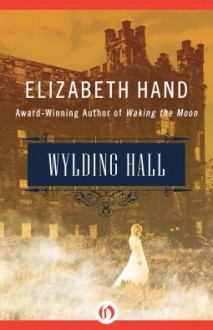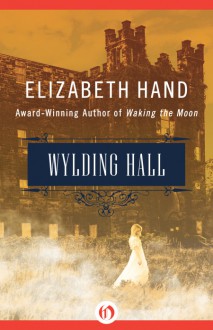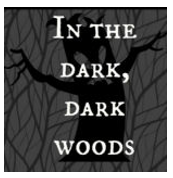
I'm almost done with March's reviewing and then I only have some comics to get done, which I can talk about a day! So easy. I'm going to force myself to catch up before I read anything new, and that's a good incentive: if I slack off too much, I fall behind on comics and I have a huuuuge stack of comics I want to read really badly.
That being said, I've regretted not immediately reviewing Wylding Hall. I feel like my best reviews are usually written right after the book, riding that high or anger-fueled snark that lingers but isn't quite the same as time passes. I will, however, try to do this book justice. On the most basic level, it's a fictional biography of a band, and what happens when their lead singer disappears right after recording their second album; years later, the band members, manager, and even the girlfriend of one of the band members tell their stories. A local boy joins in later on, as the band was secluded in a mansion to focus on recording; only later on does the boy come into play, but, boy, is he relevant!
And this doesn't do the book justice at all, because it's so much more than a biography, or a way to use multiple view points. It's also a mystery, fantasy, and horror, layered upon each other. And while normally multiple viewpoints - especially this many - feel overcrowded, and even pointless at times, Hand handles them all with aplomb. Not only that, much like she layers the genres, she layers the stories: each person brings something new, something to hook the reader, and each layer brings with it new understanding, a subtle disquiet and unease that sustains this whole thing.
It's eerie in the way an Algernon Blackwood story is: full of wonder and horror, awe inspiring, but with no real gore or even violence throughout. (There are images that bring about horror, like this one particular room, but the violence is never carried out in the novel itself.)
Folk songs are a pivotal part of this story, and with it comes the art of storytelling. This could be too much of a wink, too heavy handed, too meta because it was about the artist and thus too self-involved. It is not. Every time Hand tells us something about the art of storytelling via folk songs, it's integral to the story, tells us something about the way we tell stories - rather than being about the artists, and it all adds up to the general malaise in this novel. Given how much is packed into the short novel we get here, the scope is absolutely breathtaking. And given how little time we spend with these characters, there is so much that could go wrong: they could be unlikable as Hand focused on the point of the story she tells, or they could be sacrificed at the alter of cardboard cutouts. They are not. She could focus on the characters, and allow that general creepiness to falter. She doesn't do this either. Instead, the masterful balance she achieves always comes back to make us aware that even the quiet moments are only the calm before things get creepy as fuck again.
This story has stayed with me, not in an ever present, I can't get it out of my mind way. I've been a little preoccupied, though. It's stayed with me in that when I think about it, I am once again taken away to Wylding Hall, to the little moments that just build and build upon one another. Every time I think about this book, I am more and more impressed with what Hand's done here: the amount of time, energy, detail. The research, the weaving together of these separate tales into one cohesive whole...
I've written before, so I know how handling something of this sort can be mind-bogglingly difficult. And I'm not even going to pretend I'm nearly good enough to weave together something as intricate as Hand here, but it's not my result that's important here: even the attempt makes me appreciate just how delicate a story like this is. And it makes it even more effective for me, I think. And it's not that I was thinking this while reading; no, then I was 100% into the story. It was when I was forced to stop reading - to work, to eat, to talk to people - that I turned my thoughts to all the ways this story could have gone sideways in the hands of a lesser writer - like me.
Instead, Hand gives us something that works in every way. Full characters, a lush and dangerous world and place, and an ending that sent shivers down my spine. Love, love, love. I will be reading more Hand very soon.



 Log in with Facebook
Log in with Facebook 







